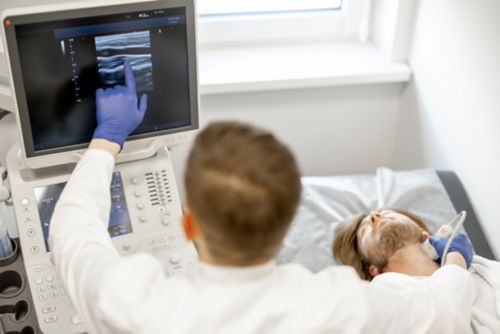Cancer survivors who had neck radiation at increased risk of blood vessel disease and stroke

Some childhood cancer survivors have an increased risk for blood vessel disease and stroke after cancer treatment.
The Children’s Oncology Group recommends screening for blood vessel disease in survivors treated with neck radiation. Your doctor may look for signs and symptoms of blood vessel disease in the neck (carotid arteries) or see if you are at high risk based on the dose of radiation you received during treatment. Screening includes:
- Feeling your pulse
- Measuring your blood pressure
- Using a stethoscope to listen for unusual sounds as the blood moves through the carotid arteries in your neck (carotid bruit assessment)
- Asking questions about your memory or nervous system (which controls how you feel and move your body)
If you have signs or symptoms that suggest blood vessel disease, your clinical team may consider ordering a carotid ultrasound.
A carotid artery ultrasound is a kind of imaging test that takes pictures of the arteries in your neck. The clinical team may consider ordering a carotid ultrasound if you:
- Had neck radiation: You are at highest risk if your radiation dose was 40 Gy or more, especially if it has been 10 or more years since treatment.
- Have symptoms suspicious for blood vessel disease
A recent study asked 8,693 survivors and their siblings if they ever had a carotid ultrasound. The study also gathered information about past treatments.
The study found that 2 out of 3 survivors, who had the highest risk of blood vessel disease, did not get carotid artery ultrasounds. While not all survivors should get carotid artery ultrasounds for screening, this study shows that survivors at risk may not be getting screening for blood vessel disease.
Survivors with a history of heart and blood vessel disease were more likely to get an ultrasound if they saw a cancer specialist or other medical specialist. Those without heart disease, but who saw a cancer specialist, were also more likely to get a carotid ultrasound.
What does this mean for you?
Most childhood cancer survivors treated with neck radiation have not had a carotid artery ultrasound. These survivors have an increased risk of blood vessel disease and stroke. If you had neck radiation as part of your cancer treatment, talk to your health care provider about your health, any symptoms you notice, and the findings from your health history and physical. This can help your doctor identify your risk for blood vessel disease and determine if you need a carotid ultrasound.
Reference
Bryce Y, Whitton JA, Stratton KL, Leisenring WM, Chow EJ, Armstrong G, Weil B, Dieffenbach B, Howell RM, Oeffinger KC, Nathan PC, Tonorezos ES. Prevalence of carotid ultrasound screening in survivors of childhood cancer: A report from the Childhood Cancer Survivor Study. Cancer. 2025 Jan 1;131(1):e3559.
